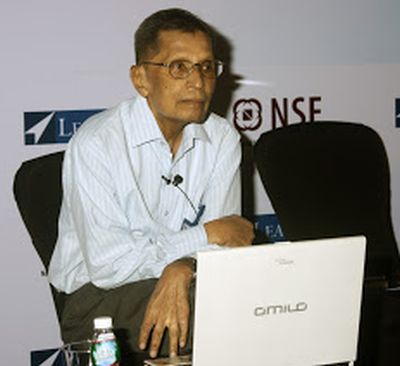 | « Back to article | Print this article |
One of the finest minds on foreign exchange management, monetary and fiscal policies, on debt and currency markets, on bank management and governance, and indeed on almost every aspect of modern finance and banking passes into the ages.
Ajit Ranade pays tribute to a beautiful mind.
A V Rajwade's passing away on Friday night is the end of an era: He was a financial journalist whose columns -- he wrote for Business Standard for many years -- were known for their intellectual honesty, a razor-sharp insight, and for never mincing their words.
His writing was pithy and plain-speaking.
His readers, many of whom were dedicated fans, included the high and mighty policymakers as well as practitioners, both young and old.
Once when Rajwade lamented that he lost a large collection of his writings in the Mumbai floods, someone from the Prime Minister's Office promptly sent all the lost copies from their personal collection.
 Indeed, the collection of Rajwade's writings over the past 40 years can be seen as a detailed chronicle of India's many-faceted journey of development and economic reforms.
Indeed, the collection of Rajwade's writings over the past 40 years can be seen as a detailed chronicle of India's many-faceted journey of development and economic reforms.
He was awarded the Shriram Sanlam Hall of Fame Award for Excellence in Financial Journalism in 2015.
Anant Vishnu Rajwade, 'Nandu' to his close friends, was born in 1936 in the Amravati district of Maharashtra.
He graduated, breaking all records and with a gold medal in mathematics and statistics, from Pune University.
He joined the State Bank of India as a probationary officer in 1956.
Even early on, he was known as a 'high-flier', and was rewarded with 'out-of-turn promotions', rising rapidly within the organisation.
Many of his colleagues from those days were convinced that he would rise to become the chairman of SBI.
But he had an independent streak and a willingness to go against the grain, for which he paid a price.
He supported a token day-long strike against the rule of 'wearing a tie'to work, for which he was moved out of the central office.
He also became the president of the SBI Officers Association, leading it to the first-ever all-India strike against worsening working conditions.
He was seen as part of legendary SBI chairman R K Talwar's group. Talwar was sacked for refusing to kow-tow to the powers that be and give loans to their cronies.
Rajwade's own life reflected those values of uncompromising honesty and a determination to stick to principles.
That did not make him a maverick, and indeed his stand was always well defended, and ultimately pragmatic.
One illustration of this is his stand as member of the second Tarapore Committee on Fuller Capital Account Convertibility.
He wrote a dissenting note, respectful but firmly disagreeing with a ban on participatory notes and any limits on foreign institutional investment in the debt market.
His views were well thought out, but his nimble mind was always willing to re-look and ready to re-examine.
He was an avid reader, quoting as effortlessly from Shakespeare or Toynbee as from Adair Turner or John Kay.
This is especially notable, for his school education was in Marathi.
There are very few in the financial analyst or commentator community who have seen first-hand the breakdown of Bretton Woods in the early 1970s and who continue to be at the forefront even in the post-Lehman world.
Rajwade was known as one of the finest minds on foreign exchange management, monetary and fiscal policies, on debt and currency markets, on bank management and governance, and indeed on almost every aspect of modern finance and banking.
It was not uncommon for governors of the Reserve Bank of India or senior policymakers to call on him for his sage advice. He was generous in sharing his knowledge and experience, and mentored many youngsters as well as companies.
As mentioned earlier, he paid the price of being on the wrong side, and quit SBI to eventually set up his own business of foreign exchange consulting in 1981.
His success as an entrepreneur was often used by a former SBI chairman to deflect demands for promotions, by jokingly saying, 'If you are so good, why don't you quit SBI and set up a roaring practice like Rajwade?'
AVR, as he was professionally known, was also active in silently helping many social causes, and mentored many well-known non-government organisations.
He was a rasik at heart, a connoisseur of classical music as well as ghazals, fine arts, and cinema.
Indeed a renaissance man, in his pursuit of scholarship, his passion for excellence, his interests in the arts and literature, his inability to suffer fools, his insistence on always calling a spade a spade, unhesitant to name wrongdoers and generous to adversaries, such a person is rare indeed.
His life is an inspiration to many, as a shining example of a man reaching extraordinary heights from ordinary beginnings and yet always remaining grounded.
Ajit Ranade is Chief Economist, Aditya Birla Group.